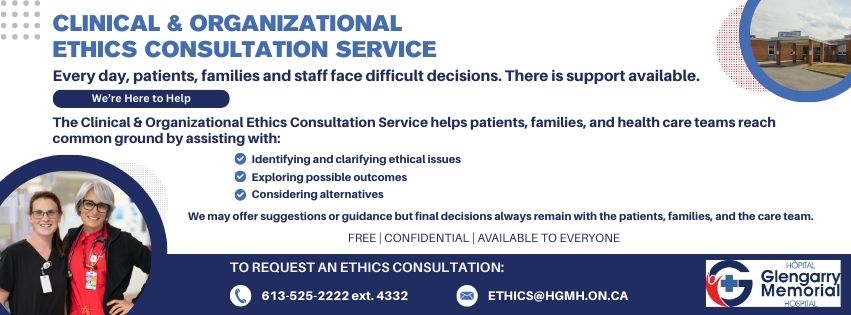Clinical & Organizational Ethics

At Hôpital Glengarry Memorial Hospital (HGMH), we understand that healthcare decisions can sometimes be challenging and complex. Our Clinical and Organizational Ethics Consultation Service is here to support healthcare workers, patients, and families in exploring thoughtful options when facing difficult ethical questions and dilemmas related to healthcare.
What is "Clinical and Organizational Ethics" in Healthcare?
In healthcare settings, ethical questions arise when "the right thing to do" is unclear, or when people disagree about what is best for a patient or organization. Clinical and organizational ethics helps guide decision-making by considering values, rights, and responsibilities. For more information, you can refer to the Champlain Centre for Healthcare Ethics at https://www.champlainethics.ca/ or email champlainethics@toh.ca.
What is the Clinical and Organizational Ethics Committee?
The Clinical and Organizational Ethics Committee is a diverse group of healthcare professionals from various backgrounds, along with an Ethicist. Together, we aim to:
- Protect the rights of individuals within the healthcare system.
- Act as a resource for decision-makers regarding patient care.
- Promote awareness and understanding of clinical and organizational ethics.
- Provide guidance on ethical considerations in policies and priorities.
We are committed to upholding HGMH’s values of Passion, Accountability, Compassion, and Teamwork at the heart of all we do, everyday.
How can the Clinical & Organizational Ethics Committee help?
Our Clinical & Orgnanizational Ethics Consultation Service is available to patients, families, and healthcare professionals to:
- Identify and understand complex ethical issues.
- Facilitate thoughtful discussion about choices and values.
- Provide advisory support (note: we do not make healthcare decisions or set organizational policies).
Examples of ethical questions we can assist with include:
- End-of-life care decisions (e.g., advance directives, withdrawal of treatment).
- Surrogate decision-making.
- Determining appropriate levels of intervention.
- Patient refusal of treatment.
- Conflicts among patients, families, and healthcare providers.
- Moral concerns raised by patients, families, or care teams.
Who can request a consultation?
Referrals for an ethics consultation can be made by:
- Physicians
- Healthcare staff and volunteers
- Patients and family members
How to Request a Consultation
To request an ethics consultation:
- Speak with your physician or nurse, or
- Contact the Clinical & Organizational Ethics Committee Chair directly at 613-525-2222 ext. 4332 or ethics@hgmh.on.ca.
You may be asked to complete a Consultation Request Form, which should include:
- A clear description of the ethical issue.
- Information about any steps already taken to address the issue.
- The name of the person making the request.
- The urgency of the matter.
Our Ethical Principles
In all consultations, we consider these core ethical principles:
- Respect for autonomy: supporting patients' rights to make informed choices.
- Beneficence: promoting well-being and doing good.
- Non-maleficence: avoiding harm.
- Justice: ensuring fairness and equity.
What to Expect?
- All consultations are confidential and follow hospital policies for patient and organizational records.
- The role of the Clinical & Organizational Ethics Committee is advisory only.
- Final decisions rest with the patient (or legal representative) and the healthcare team.
- Our goal is to create a respectful space for exploring how to act ethically and in alignment with personal and organizational values.
At HGMH, we are committed to being a compassionate provider of patient-centered health services. Our Ethics Consultation Service reflects our pledge to support thoughtful, value-based care for every patient and family.

